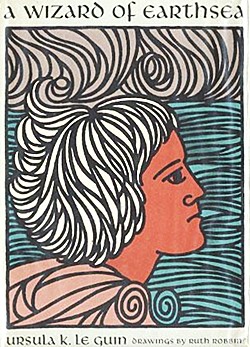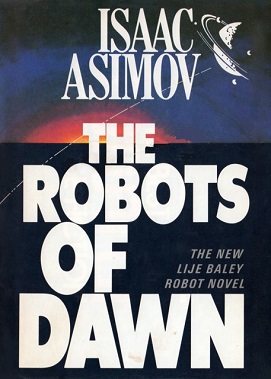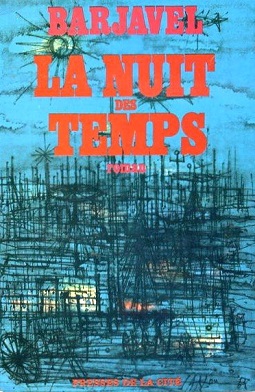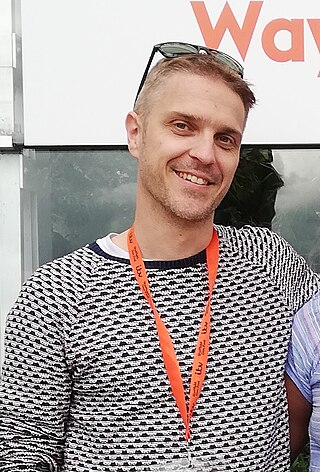Related Research Articles

Alternate history is a subgenre of speculative fiction in which one or more historical events have occurred but are resolved differently than in actual history. As conjecture based upon historical fact, alternate history stories propose What if? scenarios about crucial events in human history, and present outcomes very different from the historical record. Some alternate histories are considered a subgenre of literary fiction, science fiction, or historical fiction.

A Wizard of Earthsea is a fantasy novel written by American author Ursula K. Le Guin and first published by the small press Parnassus in 1968. It is regarded as a classic of children's literature and of fantasy, within which it is widely influential. The story is set in the fictional archipelago of Earthsea and centers on a young mage named Ged, born in a village on the island of Gont. He displays great power while still a boy and joins a school of wizardry, where his prickly nature drives him into conflict with a fellow student. During a magical duel, Ged's spell goes awry and releases a shadow creature that attacks him. The novel follows Ged's journey as he seeks to be free of the creature.

The Robot series is a series of thirty-seven science fiction short stories and six novels created by American writer Isaac Asimov, published from 1940 to 1995. The series is set in a world where sentient positronic robots serve a number of purposes in society. To ensure their loyalty, the Three Laws of Robotics are programmed into these robots, with the intent of preventing them from ever becoming a danger to humanity. Later, Asimov would merge the Robot series with his Foundation series.
Dragonlance is a shared universe created by Laura and Tracy Hickman, and expanded by Tracy Hickman and Margaret Weis under the direction of TSR, Inc. into a series of fantasy novels. The Hickmans conceived Dragonlance while driving in their car on the way to TSR for a job interview. Tracy Hickman met his future writing partner Margaret Weis at TSR, and they gathered a group of associates to play the Dungeons & Dragons role-playing game. The adventures during that game inspired a series of gaming modules, a series of novels, licensed products such as board games, and lead miniature figures.
The Deptford Trilogy is a series of inter-related novels by Canadian novelist Robertson Davies.

In literature, an epigraph is a phrase, quotation, or poem that is set at the beginning of a document, monograph or section thereof. The epigraph may serve as a preface to the work; as a summary; as a counter-example; or as a link from the work to a wider literary canon, with the purpose of either inviting comparison or enlisting a conventional context.

The Years of Rice and Salt is an alternate history novel by American science fiction author Kim Stanley Robinson, published in 2002. The novel explores how world history might have been different if the Black Death plague had killed 99 percent of Europe's population, instead of a third as it did in reality. Divided into ten parts, the story spans hundreds of years, from the army of the Muslim conqueror Timur to the 21st century, with Europe being re-populated by Muslim pioneers, the indigenous peoples of the Americas forming a league to resist Chinese and Muslim invaders, and a 67-year-long world war being fought primarily between Muslim states and the Chinese and their allies. While the ten parts take place in different times and places, they are connected by a group of characters that are reincarnated into each time but are identified to the reader by the first letter of their name being consistent in each life.

Tehanu, initially subtitled The Last Book of Earthsea, is a fantasy novel by the American author Ursula K. Le Guin, published by Atheneum in 1990. It is the fourth novel set in the fictional archipelago Earthsea, following almost twenty years after the first three Earthsea novels (1968–1972), and not the last, despite its subtitle. It won the annual Nebula Award for Best Novel and the Locus Award for Best Fantasy Novel.
A book series is a sequence of books having certain characteristics in common that are formally identified together as a group. Book series can be organized in different ways, such as written by the same author, or marketed as a group by their publisher.

Malazan Book of the Fallen is a series of epic fantasy novels written by the Canadian author Steven Erikson. The series, published by Bantam Books in the U.K. and Tor Books in the U.S., consists of ten volumes, beginning with Gardens of the Moon (1999) and concluding with The Crippled God (2011). Erikson's series presents the narratives of a large cast of characters spanning thousands of years across multiple continents.

Bernard Werber is a French science fiction writer, active since the 1990s. He is chiefly recognized for having written the trilogy Les Fourmis, the only one of his novels to have been published in English. This series weaves together philosophy, spirituality, science fiction, thriller, science, mythology and consciousness.
The exploration of politics in science fiction is arguably older than the identification of the genre. One of the earliest works of modern science fiction, H. G. Wells’ The Time Machine, is an extrapolation of the class structure of the United Kingdom of his time, an extreme form of social Darwinism; during tens of thousands of years, human beings have evolved into two different species based on their social class.

The legendary island of Atlantis has often been depicted in literature, television shows, films and works of popular culture.

The Ice People is a 1968 French science fiction novel by René Barjavel.

Les Fourmis is a 1991 science fiction novel by French writer Bernard Werber. It was released in English as Empire of the Ants. The book sold more than two million copies and has been translated into more than 30 languages. It was also taken to video game format.

The Renegades of Pern is a science fiction novel by the American-Irish author Anne McCaffrey. It was the tenth book published in the Dragonriders of Pern series. It was first published in 1989.

Dying Earth is a subgenre of science fantasy or science fiction which takes place in the far future at either the end of life on Earth or the end of time, when the laws of the universe themselves fail. Themes of world-weariness, innocence, idealism, entropy, heat death of the universe, (permanent) exhaustion/depletion of many or all resources, and the hope of renewal dominate. A related subgenre set in the distant future of entropic decay is called entropic romance.

Olivier Magis is a Belgian director.
Akil Kumarasamy is an American author and an assistant professor in the Masters of Fine Arts Program in Creative Writing at Rutgers School of Arts and Sciences-Newark. Her collection of short stories Half Gods won The Story Prize Spotlight Award and the 2021–2022 Annual Bard Fiction Prize. Her novel Meet Us by the Roaring Sea was released in August 2022.
References
- ↑ "Les Thanatonautes". Goodreads. Retrieved 25 January 2024.